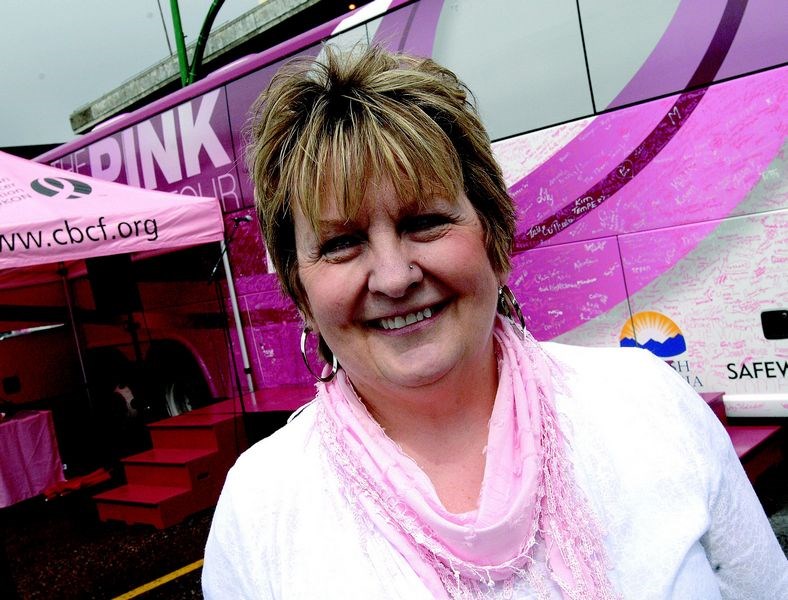A big pink bus came to town Thursday and Friday as part of the Pink Tour, Power in Knowledge program to promote mammograms for all women over 40. Early detection leads to significantly higher survivor rates for women diagnosed with breast cancer.
The knowledge session was held as part of the CIBC block party between Second and Third Avenues on Brunswick Street Thursday afternoon.
An opening prayer was offered by Darlene McIntosh, Elder, Lheidli T'enneh Band.
Several speakers said a few words about the importance of early detection including Dr. Winston Bishop, founder and director of the Regional Cancer Care Unit at the University Hospital of Northern B.C. in 1977, Linda Morris, CEO of the Canadian Breast Cancer Foundation, BC/Yukon regional and Shirley Bond, Minister of Transportation and Infrastructure.
"I just came from Vancouver where I gave a speech asking people to make smart choices and not drink and drive," said Bond. "I am asking you today to do the same thing. Make smart choices and get a mammogram for early detection of breast cancer."
The most poignant words came from breast cancer survivor Roxanne Evans, who recounted how a tumour was discovered through her regularly scheduled mammogram in April of 2009 and the mastectomy and reconstructive surgery that followed.
"I went to the doctor with my husband after the mammogram and ultra sound," said Evans. "The doctor said I am very sorry, you have breast cancer. We went to the car and my husband was sobbing. I was comforting him. I think I was in denial. This is something that happens to other people."
She went on to say how reality set in after her first chemotherapy treatment and she struggled with low energy and depression. With the love and support of family and friends and her new support group the Northbreast Passage Dragonboat team she learned to cope with cancer.
"I want to help others that are on their own cancer journey by telling my story and encouraging others to get a mammogram for early detection," Evans said. "It is key to survival."
The 45-foot pink bus will visit more than 100 communities and so far 3,720 British Columbians have been through the bus with more than 287 signing up for a mammogram. It is retrofitted with information about breast health, the importance of getting a mammogram and lifestyle choices that can decrease a woman's risk of developing breast cancer.
Tour staff will guide visitors through the interactive displays and encourage women between 40 and 79 to book a free mammogram in their communities.
Only 51 per cent of eligible women in B.C. take advantage of the free screening program. In 2009, 57 per cent of eligible women between ages 50 and 69 in B.C.'s Northern Interior had mammograms. According to the World Health Organization, if 70 per cent of eligible women went for regular mammography, the number of deaths from breast cancer would be reduced by up to one third.


